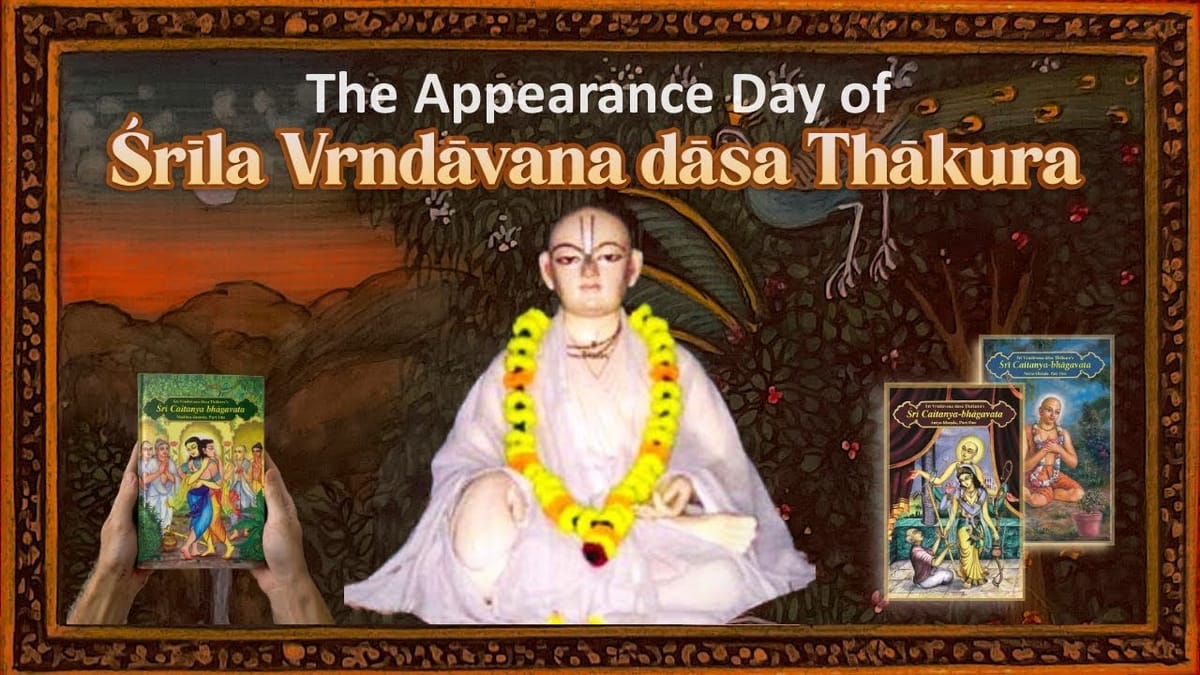Avoiding the Perils of Vaiṣṇava-nindā — Part One (Teachings from Śrī Caitanya-bhāgavata)

Jaya Śrīla Vṛndāvana dāsa Ṭhākura ki jaya!
Today I’m beginning a series that I plan to periodically translate and share, centered on the dangers of criticizing Vaiṣṇavas (vaiṣṇava-nindā) as it appears in Śrī Caitanya-bhāgavata. During last year’s daily online readings of Śrī Caitanya-bhāgavata, this subject of vaiṣṇava-aparādha kept coming up again and again—it really struck me as one of the most central and recurring themes.
This morning, I revisited Bhumipati Prabhu’s translation of Śrī Caitanya-bhāgavata, along with the commentaries of Śrīla Bhaktisiddhānta Sarasvatī Ṭhākura Prabhupāda, and compiled every section related to vaiṣṇava-nindā into a Word document. Altogether, it came to over 20,000 words!
For now, I’m just sharing the tiniest drop from that collection—just one verse tonight, since I got a late start. But I wanted to begin this series today, in honor of Śrīla Vṛndāvana dāsa Ṭhākura’s appearance day. I’ll continue translating and will post the remaining verses from this section tomorrow.
বৈষ্ণবে ভেদ-দর্শনকারীর দুর্গতি লাভ—
The Misfortune of One Who Perceives Differences Among Vaiṣṇavas—
Śrī Caitanya-bhāgavata (Madhya-khaṇḍa 5.137):
নিত্যশুদ্ধ জ্ঞানবন্ত বৈষ্ণবসকল ।
তবে যে কলহ দেখ, সব কুতূহল ॥
nitya-śuddha jñānavanta vaiṣṇava-sakala
tabe ĵe kalaha dekho, saba kutūhala
All Vaiṣṇavas are eternally pure and endowed with transcendental knowledge. Therefore, any quarrel you observe among them is entirely a playful affair.
Gauḍīya Bhāṣya by Śrīla Bhaktisiddhānta Sarasvatī Gosvāmī Prabhupāda
শুদ্ধ বৈষ্ণবগণ নিত্য-শুদ্ধজ্ঞানে জ্ঞানী । সেইরূপ অপ্রাকৃত বৈষ্ণবের মধ্যে যে পরস্পর মতভেদ, তাহা কেবল চমৎকারিতা-বৃদ্ধির জন্য বর্তমান । বস্তুতঃ আত্মধৰ্ম্মিগণের মধ্যে কোনও মতভেদ নাই ৷ মনোধর্ম্মিগণের মধ্যেই মতভেদ বৰ্ত্তমান ৷ আত্ম-ধর্ম্মিগণের মতভেদের আকার আত্মধর্ম্মের বিচিত্রতা বিস্তার করে। তাহাতে জড়ীয় ভোগ ও ত্যাগ বা মিছাভক্তির কোলাহল নাই ।
Pure Vaiṣṇavas are wise with eternally pure knowledge (nitya-śuddha-jñāna). Any apparent difference of opinion found among such transcendental Vaiṣṇavas exists solely to increase astonishing variegatedness (camatkāritā). In truth, there are no divergent opinions among those who are situated in their spiritual nature (ātmā-dharmīs). Differences of opinion are found only among those who operate on the mental plane (mano-dharmīs). The appearance of varied perspectives among spiritually situated souls serves to unfold the variety of spiritual nature (ātmā-dharma). Within this, there is no clamor of materialistic enjoyment and renunciation, nor the noisy display of false or pretentious devotion (michā-bhakti).
Comments ()